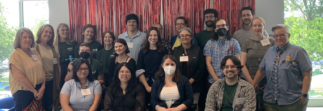MIT GIS Services will be offering a series of workshops to introduce the MIT community to Geographic Information Systems and the world of Digital Mapping. All workshops will combine lectures about concepts with hands-on exercises.
MIT GIS Services are cooperatively supported by the MIT Libraries, the Office of Educational Innovation and Technology (OEIT), and MIT Information Services & Technology (IS&T).
WHERE: All sessions take place in the DIRC (14N-132), with the exception of the Python session (see below), which takes place in the Rotch Library, 7-238.
NOTE: Advance sign-up is required by January 19 for several sessions – see notes below.
Check out the GIS website for copies of presentations, exercises and more. Also check out the MIT Libraries’ complete listing of IAP offerings.
Introduction to Geographic Information Systems (GIS)
Learn the basics of visualizing and analyzing geographic information and creating your own maps in a GIS. Learn to work with data from the MIT Geodata Repository, analyze the data and create maps that can be used in reports and presentations. Registration is required and this workshop is only open to people with MIT kerberos accounts.
WHEN: Friday, January 15, 2 – 4pm & Tuesday, January 19, 2 – 4pm (duplicate session)
ModelBuilder for beginners
Learn to build graphic models of your GIS processes. ESRI’s ModelBuilder helps you to visualize the process you use and makes it easy to document your work for thesis or for publication. We will create models to automate processes learned in the ‘Site Selection’ workshop. This session is targeted toward beginners.
WHEN: Wednesday, January 20, 10:30-11:30am
Introduction to Spatial Statistics using GIS
Have you ever wondered if your data is dispersed or clustered? Are there patterns? This workshop will introduce participants to basic statistical tools that can be used to analyze spatial data. While we will primarily use ArcGIS, we will also briefly discuss alternative software for analyzing spatial data. A basic knowledge of statistics and GIS (especially ArcGIS) is helpful. Registration is required and this workshop is only open to people with MIT kerberos accounts.
WHEN: Wednesday, January 20, 2 – 4pm
Mapping and Using US Census Data
The US Census holds an enormous amount of demographic information dating back to 1790. New and interesting relationships can be observed when looking at census data on a map. Come learn about what is in the US Census and how to use some of the tools available for mapping it.
WHEN: Thursday, January 21, 2 – 4pm
Site Selection – Making Spatial Decisions Using a GIS
Learn to select a new project location based on a variety of data types and perform analysis using tools provided in ArcGIS. Pre-requisite: Participants should take the Introduction to GIS or have previous experience using ArcGIS.
WHEN: Friday, January 22, 2 – 4pm
Using Elevation Data and Hydrographic Tools in a GIS
Learn to read a topographic map and how to use a digital elevation model to create contour lines and do hydrographic analysis. Pre-requisite: Participants should take the Introduction to GIS or have previous experience using ArcGIS.
WHEN: Monday, January 25, 2 – 4pm
Model Builder for Programmers
Learn to use model builder for automating complex processes in GIS. This tool is useful for increasing efficiency and documenting your work. We will create models to automate processes learned in the ‘Elevation and Hydrographic Tools’ and ‘Site Selection’ workshops. Pre-requisite: Participants should take the Introduction to GIS or have previous experience using ArcGIS.
WHEN: Tuesday, Januray 26, 2 – 4pm
Python Programming for GIS
An introduction to scripting for geographic analysis systems. Scripting in Python is an efficient method of automating analysis in ArcGIS. An understanding of programming concepts is useful; an intermediate level of ArcGIS is necessary.
WHEN: Wednesday, January 27, Thursday, January 28, and Friday, January 29, 9am – 12pm
Please fill out this survey, as there are several technical considerations for this class.
Contact Daniel Sheehan or David Quinn with questions about the Python session or the GIS staff for general questions about the rest of the sessions.


